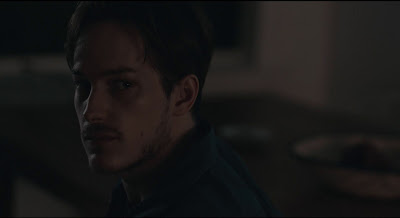If I can help it, I will never miss a film by
Boaz Yakin. This fascinating, accomplished director and writer (not always within the same film) has given us a raft of good movies, with each of his directorial efforts in a different genre. What his films have in common, seems to me, is their placing an outsider at the center and having him/her eventually -- often at great, if not pyrrhic, cost -- win the day. His latest,
AVIVA, as per usual, is not simply in another genre; it mashes up several into something that seems pretty much
sui generis.
Mr. Yakin, shown at right (some years back), is always as interested in content as in visuals, but
Aviva may be the most visual of all his films, even if not nearly his best.
There's a stunning shot of hands on mugs on a table early on followed by several of the kind of memorable images that, when you think of this film later on, you will probably call to mind -- one of which appears just below. (His cinematographer this time around is
Arseni Khachaturan, with film editing by
Holle Singer.)
For a good while during this film, thanks to everything from the very hot looking men and women, the copious amounts of nudity (often male and full-frontal, prudes be warned), the sex scenes, the openness to both hetero-and homosexuality and the enormous contribution of dance (much of it quite good) to the film, this seemed to
TrustMovies to be the most fun he has had at the movies all year. Then, somewhere around the midway point, repetition begins to set in (along with the nagging sense that there is less here, content-wise, than meets the eye and mind), and
Aviva comes subsequently only fitfully to life. Though when it does, it can still prove pretty magical, off and on.
The problem, to my mind, is that the movie's strengths and weaknesses go hand in hand with its director's own, because, I suspect, this film is giving us Yakin's own story and struggle. Although there are four actors credited with playing, sort of, two roles -- that of the titular Aviva (both the female and male versions) and Eden (again, the male and female) -- really, I think, these are all just sides of Yakin himself, who wrote and directed the piece and who is clearly struggling with identity, sexuality, commitment, growth and all the rest of it. (Who of us is not? Though some of us maybe don't realize this yet.)
The biggest problem here is that Yakin seems to identify most, and understandably so, with the male version of Eden (played by a most attractive and nicely hung actor/dancer named
Tyler Phillips, above, who is making his movie debut) and who has to deal throughout with a kind of hang-dog attitude in which guilt, coupled to the inability to rise above this and grow up, leads to his growing tiresome and beginning to bore the bejesus out of us. He waffles and he wavers and he can't commit and he's pretty much of an asshole, overall.
While the female Eden, played by
Bobbi Jene Smith (above, center left) rather echoes her male counterpart, Ms Smith at least supplied the choreography and some of the fine dancing, she also supplies a lot more energy and pizzazz than does Mr. Phillips, and so watching her is not such a drag. She, along with her companion and co-choreographer
Or Schraiber (see below) also appeared together in the 2017 documentary,
Bobbi Jene.
The title role, female version is essayed by an attractive and appealing Russian-born actress,
Zina Zinchenko (above), while the male version is played by hottie, dancer and co-choreographer (the aforementioned Mr. Schraiber, below), who brings a vast quantity of sex appeal and dance knowledge to the proceedings. (Don't worry if all these sexes and characters seem confusing. Eventually they run together into a kind of sameness, some of which is no doubt intentional on the part of Yakin; the rest of it simply follows.)
Dance is just about everywhere here, and sex is, too. (To his great credit, the filmmaker does not stint on the homo over the supposedly more important role of the hetero, the point being that it is all one.) The production design is spectacular, with locations in Paris, New York and Los Angeles. Unfortunately, the word
love is tossed about so carelessly and often that you'll realize the filmmaker -- like so many of us -- is perhaps vamping, while he learns the meaning of the word.
And when, toward the end, a character screams out, "
Please! We can't do this anymore," you'll probably agree. At a near two-hour running time, shorter would have been better. Particularly when that male version of Eden is, to use
Bill Maher's description of Donald Trump, such a "whiny little bitch." Still, as with just about everything Yakin has given us, when it's good, it is
so good, that I would watch it all over again.
From
Outsider Pictures and
Strand Releasing,
Aviva, in all its too-long glory, will hit virtual theaters this coming Friday, June 12. Click
here and then scroll down to find the virtual theaters across the country in which the film will play. (There will be a free live-stream Q&A on Saturday, June 13; Sunday June 14; and Saturday, June 20. Click
here for more information.)






















































